DY Patil University, School Of Ayurveda, Navi Mumbai is one of the Top colleges in Navi Mumbai, Maharashtra. it's Affiliated with DY Patil University, Navi Mumbai. Get Courses, Facilities, Placements, Recognitions & Accreditations details.
DY Patil University School Of Ayurveda Latest Updates
DY Patil University School Of Ayurveda, Navi Mumbai is one of the top-ranked university in Maharashtra, with an excellent academic curriculum, placements, facilities, and esteemed faculty members. DY Patil University School Of Ayurveda is admission open 2024 accepting applications for all UG and PG courses for the academic session 2024-25. DY Patil University School Of Ayurveda Navi Mumbai provides Scholarships for student's academic excellence and extracurricular achievements, also offers Merit-Based Scholarships for candidates based on merit scores in National & State Level competative exams as well as College Level Test. Interested candidates can apply to their preferred course by visiting the official website.
Here are some other Updates are as follows:
- The DY Patil University School Of Ayurveda has recently conducted a placements drive for the 2024 passing out batch students and provides handsome salary packages.
- DY Patil University School Of Ayurveda is also accepting applications from International Candidates for UG, PG, Diploma, and Certificate courses.
- DY Patil University School Of Ayurveda Navi Mumbai offered upto 100% Scholarships to eligible candidates based on their academic excellence and extracurricular achievements.
- DY Patil University School Of Ayurveda, Navi Mumbai has world-class infrastructure facilities for students and staff.
DY Patil University School of Ayurveda was established in 2004. It has been approved by the Central Council of Indian Medicine (CCIM), the Department of AYUSH, and the Ministry of Health and Family Welfare in New Delhi. The school has a separate Ayurvedic hospital within it. The school offers a UG course and 12 different PG programs in Ayurveda. It also provides 4 various diploma courses, a Ph.D. program, and a certificate course. DY Patil University School of Ayurveda was ranked 55th by NIRF among the top universities in India and is affiliated with DY Patil University, Navi Mumbai.
Accreditation and Ranking
DY Patil University, School Of Ayurveda, Navi Mumbai DYPUSA Approved by Central Council of Indian Medicine (CCIM), Department of AYUSH, and the Ministry of Health and Family Welfare in New Delhi. And Affiliated with DY Patil University, Navi Mumbai.
Courses Offered
DY Patil University, School Of Ayurveda, Navi Mumbai DYPUSA Courses are offered at various levels Diploma Degree i.e Diploma in Yoga and Naturopathy (DYN) Postgraduate Degree i.e Doctorate of Medicine (MD) Ayurveda Kaumarabhritya, and many more. You can also find a brief overview of the different courses offered by the university across various disciplines with their specializations on the Course page.
DY Patil University School Of Ayurveda, Navi Mumbai campus life
Campus life at DY Patil University School Of Ayurveda, Navi Mumbai is just phenomenal. The DY Patil University School Of Ayurveda, Navi Mumbai, Maharashtra and its Campus life provides lots of extracurricular activities like talent in dance, singing, art, literature, anchoring, event management, modelling and drama. DY Patil University School Of Ayurveda Navi Mumbai campus life and environment is lively and friendly. The premises have sufficient facilities- medical help, food, and departmental store, etc. to fulfil every need of the students.
At DY Patil University School Of Ayurveda campus you get chance to groom your personality, learn something new. Also, All the festivals are celebrated with extreme enthusiasm at DY Patil University School Of Ayurveda campus Navi Mumbai so that students feel like home. Sports meet and annual college fests are huge stages for students to showcase their talent. Once you will graduate you will definitely miss the DY Patil University School Of Ayurveda, Navi Mumbai campus life.
DYPUSA Infrastructure and Facilities
Students Facility CLASSROOM
Classrooms with a capacity of 100 students are equipped with state–of–the–art technology, to ensure a complete learning experience. Key elements of the classrooms include furniture designed and arranged to facilitate collaboration, and sufficient electrical outlets to provide adequate power supply to charge students’ and teachers’ devices. Classrooms are fitted with whiteboards and desk podiums with an additional projection screen, ceiling mounted LCD projector to facilitate multi-dimensional teaching and learning.
DYPUSA CONFERENCE ROOM
A centrally air-conditioned audio-visual cum seminar hall equipped with advanced audio-visual gadgets is made available for various academic, curricular, co-curricular, and interdepartmental activities. It is equipped with a projection screen and an LCD projector with USB ports.
DYPUSA Library
A library is a treasure house of knowledge. Libraries are an integral part of the education system and the Education system remains incomplete without the library. D.Y.P University School of Ayurveda has one of those libraries which is defined by its well-equipped collection of numerous Books, National and International Journals. To enhance the Teaching learning process the library is accomplished with a special section of a rare collection of books to foster quest in students. The library is housed on the second floor of our college building. It is designed to provide comfortable reading accommodation in abundant light, air, and a pleasant atmosphere with a sitting capacity of 100 students, which includes a reference/reading section, and a circulation section.
DYPUSA Sharir Rachana Department
MUSEUM: There is a bone-cutting machine for sectioning body parts. There are 11 cadaver dissection tables and 11 organ dissection tables. 2 mummified bodies are available for the study of surface anatomy. Several whole and dissected viscera have been exhibited for visual understanding. There is an infant skeleton in the museum. Preservation of specimens is keenly observed. There is adequate stock of preservative liquids which is maintained from time to time. There is open access to the museum for students and any person who is interested in acquiring knowledge and understanding about the body's organs. The Schools in the Periphery are allowed to visit the department.
DYPUSA Department of Kriya Sharir
The department of Kriya Sharir has a well-equipped laboratory, and library with a vast collection of books on various topics with an e-library. ICT facilities, electronic models, and various software make the subject more appealing to the e-generation. To make it easy for obtaining knowledge, electronic models on the functioning of the cardiac system, and the cardiac cycle are made in the department. Research-oriented practices of laboratory & human experiments are being taken regularly. Discussions and emerging trends regarding the correlative study of Kriya Sharir & modern physiology is followed.
DYPUSA Department of DravyagunaVigyan
Department of DravyagunaVigyan encompasses a Herbal Garden for educational and demonstration purposes for arriving at a true and scientific understanding of the herbs and their role in ayurvedic medicine. With a mission to strengthen the Ex-situ Conservation activities of Medicinal & Aromatic plants of us and to educate the students, medicinal plants have been maintained in the Herbal garden spread over two acres. Around 291 species of Medicinal plants with 3312 in number are nurtured in the garden. Plants of commercial importance too are grown in the Garden. A greenhouse that ensures a controlled environment is housed to nurture some rare and endangered species. Spanning around 10,000 sq. ft this Green House unique with a sacred grove of Nakshatravana, RashiVanahas has been developed to understand the significance of plants from times immemorial. The entire garden is beautified by ornamental plants species of plants as well. The herbal garden serves as a reservoir of information on medicinal plants for students, researchers, interdisciplinary faculties, and the general public.
Best Practices of the Department
1) Preservation of Medicinal Plants with a theme of Biodiversity has been developed viz., demo garden-nakshatravana, Rashivana, Complementary Alternative Medicines, and folklore medicinal plants.
2) Interdisciplinary Visits of Students, faculties from Various Institutes and Schools
DYPUSA Department of Rognidan and Vikruti Vidnyan
The total floor area of the Department is 1700 sq. ft. which includes faculty cabins for 1 Professor, 2 Associate Professors & 2 Assistant Professors, Lab technicians & Nonteaching staff rooms, Departmental Library, Central Pathology & Microbiology Lab, a Tutorial room, a computer room.
The total area of Central Pathology is 663.44 sq. ft. It is well equipped with all required & essential advanced instruments, equipment, and consumables stock. There are 2099 instruments and equipment which fulfill all the requirements of the teaching Lab like a Hematology fully automatic cell counter, Biochemistry Analyzer, Monocular Microscopes, Binocular Microscopes, Ophthalmoscope, ECG Machine, Digital Photoelectric Colorimeter, Centrifuge Machine, Autoclave, Hot Air Oven, Microbiological Incubator, Rotary Microtome Machine, Glucometer, Goniometer, and Serological Water Bath. There are 3634 glass wares and plastic wares along with various reagents and Materials in liquid and powder form in appropriate quantities for hands-on training for practicals to students. Hematology, Clinical Pathology, Biochemistry, and Serology practicals are conducted in the lab which includes major pathological investigations. Plenty of Abnormal Radiological films of X-ray, CT scan, M.R.I., and E.C.G. are available for practical demonstration to the student. There are availability 0f 40 pathological gross specimens and 100 histopathological slides. Preservation of specimens is keenly observed. There is adequate stock of preservative liquids which is maintained from time to time. There is open access to the museum for the students. It helps the student to learn the pathology in detail. The departmental library has 120 books including both Ayurvedic and Modern books and research Journals. Along with these books Post Graduation dissertations are also available for reference and guidance. Department of Rognidan and Vikruti Vidnyan have 126 Charts, 15 models, and 14 Photographs for the visual understanding of the subject.
Best Practices of the Department
1) Students are trained in such a way that to become proficient & skillful in the diagnosis techniques by applying Ayurvedic methodology as well as modern technologies.
2) Students are trained in bedside Examinations along with the clinical interpretation of modern advanced diagnostic investigations.
DYPUSA LABORATORY
Department of Kriya Sharir
The department of Kriya Sharir has a well-equipped laboratory. To make it easy for obtaining knowledge, electronic models on the functioning of the cardiac system, and the cardiac cycle are made in the department. Research-oriented practices of laboratory & human experiments are being taken regularly. Discussions and emerging trends regarding the correlative study of Kriya Sharir & Modern Physiology are followed.
DYPUSA Department of Rasashastra
Department of Rasashastra and Bhaishajya Kalpana has a spacious well-equipped laboratory, Museum which is designed with various samples of prepared medicines according to their dosage form, models of equipment (yantra), Charts of various sizes, Specimens, Instruments, Educational Models, and customized machinery. With the help of well-equipped labs, this department imparts training in medicinal chemistry and the preparation of highly potent medicines from minerals and metals. We have a good teaching pharmacy with Machineries like Pulverizer, Mass mixer, Muffle furnace, etc. Research Laboratory for Quality Control Library with a vast collection of books (Ayurvedic & Modern) on various topics for undergraduate and postgraduate scholars. Knowledge of Ayurvedic Pharmacy encompasses field identification of medicinal plants and other natural substances, collection and storage procedures of raw materials, preliminary processing of raw drugs, elaborate and sophisticated methods of pharmaceutical processing, and preservation of prepared medicines.
DYPUSA Department of Dravyaguna
Department of Dravyaguna Vigyan encompasses a Herbal Garden for educational and demonstration purposes for arriving at a true and scientific understanding of the herbs and their role in ayurvedic medicine. With a mission to strengthen the Ex-situ Conservation activities of Medicinal & Aromatic plants of us and to educate the students, medicinal plants have been maintained in the Herbal garden spread over two acres. Around 291 species of Medicinal plants with 3312 in number are nurtured in the garden. Plants of commercial importance too are grown in the Garden. A greenhouse that ensures a controlled environment is housed to nurture some rare and endangered species. Spanning around 10,000 sq. ft this Green House unique with a sacred grove of Nakshatravana, Rashi Vanahas has been developed to understand the significance of plants from times immemorial. The entire garden is beautified by ornamental plants species of plants as well. The herbal garden serves as a reservoir of information on medicinal plants for students, researchers, interdisciplinary faculties, and the general public.
DYPUSA Department of Rognidana
The total floor area of the Department is 1700 sq. ft. which includes faculty cabins for 1 Professor, 2 Associate Professors & 2 Assistant Professors, Lab technicians & Nonteaching staff rooms, Departmental Library, Central Pathology & Microbiology Lab, a Tutorial room, a computer room.
The total area of Central Pathology is 663.44 sq. ft. It is well equipped with all required & essential advanced instruments, equipment, and consumables stock. There are 2099 instruments and equipment which fulfill all the requirements of the teaching Lab like a Hematology fully automatic cell counter, Biochemistry Analyzer, Monocular Microscopes, Binocular Microscopes, Ophthalmoscope, ECG Machine, Digital Photoelectric Colorimeter, Centrifuge Machine, Autoclave, Hot Air Oven, Microbiological Incubator, Rotary Microtome Machine, Glucometer, Goniometer, and Serological Water Bath.
The departmental library has 120 books including both Ayurvedic and Modern books and research Journals. Along with these books Post Graduation dissertations are also available for reference and guidance. Department of Rognidan and Vikruti Vidnyan have 126 Charts, 15 models, and 14 Photographs for the visual understanding of the subject.
Central Research Laboratory
Advances in medical sciences come from novel ideas and approaches developed through research. Central Research Laboratory is a facility that provides centralized research infrastructure to benefit researchers, undergraduates, Postgraduates, and clinicians of D. Y. Patil deemed to be the University School of Ayurveda, Nerul, Navi Mumbai.
DYPUSA Admission
Eligibility Criteria
1) UG :- HSC Science equivalent with minimum 50% Marks + NEET Qualified
2) PG:- BAMS with AIPGET-AYURVED
3) Ph.D.:- MD / MS in Concern Subject
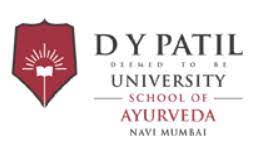
 Navi Mumbai, Maharashtra
Navi Mumbai, Maharashtra
 Collage
Collage
 2004
2004
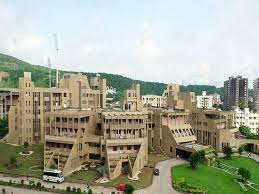
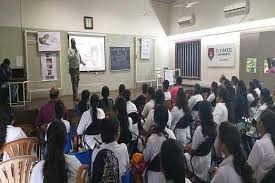
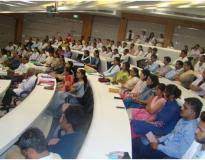
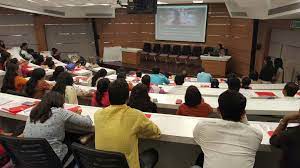
![Dev Bhoomi Uttarakhand University - [DBUU], Dehradun](https://cdn.universitykart.com//Content/upload/admin/lsfohlb4.1j1.png)



 back
back